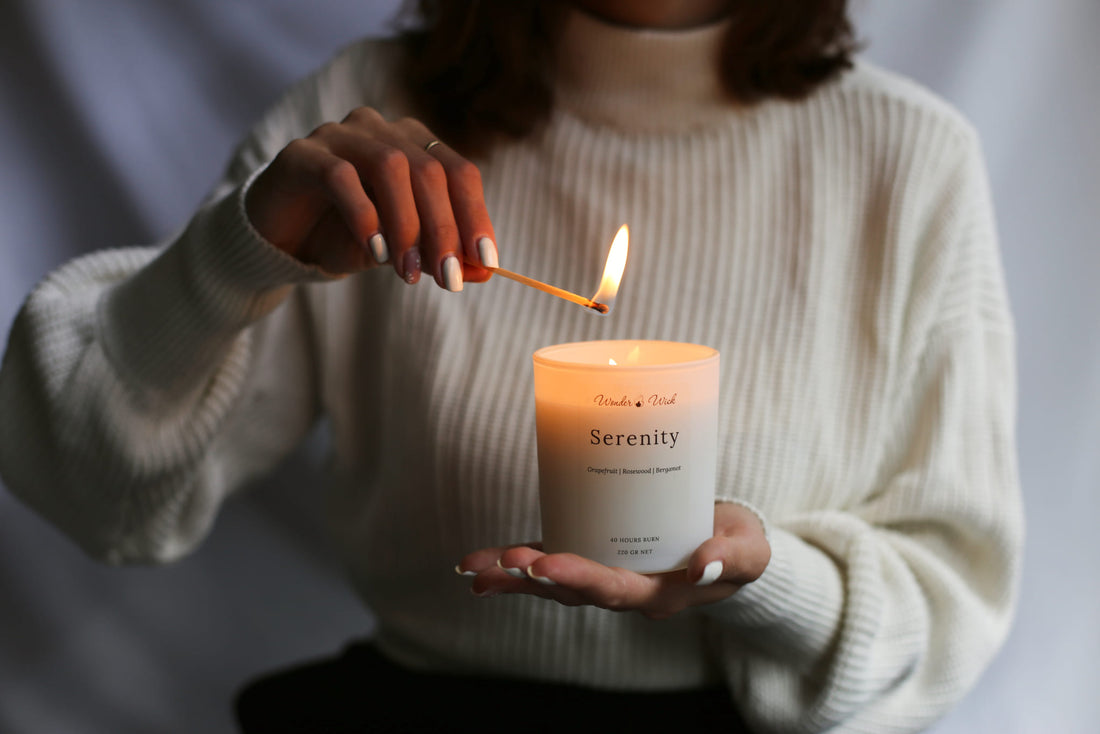
Do Aromatherapy Candles Work?
Share
Ever light a candle, inhale deeply, and feel a wave of calm wash over you? That's the power of aromatherapy candles. But can they truly influence our mood and well-being?
In this blog post, we'll explore the growing body of research on aromatherapy and how natural candles made with essential oils can impact your wellness experience.
What is aromatherapy?
Aromatherapy is a holistic healing practice that uses essential oils – concentrated plant extracts that capture the plant's aromatic compounds – to promote relaxation, improve mood, and even ease physical discomfort.
These essential oils are inhaled or absorbed through the skin. When inhaled, the scent molecules travel up your nose to the olfactory bulb, which is connected to your limbic system, the part of your brain that manages emotions, memories, and hormone regulation.
Based on the properties of the inhaled essential oil, the limbic system will trigger the release of specific hormones. Inhaling calming essential oils like lavender can trigger the release of serotonin and endorphins, promoting relaxation. Invigorating scents like peppermint, on the other hand, can stimulate the limbic system to increase alertness.
How do aromatherapy candles work?
Aromatherapy candles use heat to release the essential oils' scent molecules into the air. As you inhale the scent, the essential oils interact with your body in two ways:
- Aromatherapy
- Scent association
Let's break down each of these methods.
Aromatherapy
As mentioned above, the essential oils' molecules can stimulate the limbic system, influencing your mood and well-being.
For example, clary sage, known for its herbaceous aroma, is traditionally used to balance hormones and ease menstrual cramps. Studies suggest it may help regulate menstrual cycles, particularly for those with PCOS, and offer pain relief from cramps.
Ylang ylang, a floral oil with a sweet fragrance, is traditionally used as an aphrodisiac. Studies suggest it may promote relaxation through its effect on blood pressure, and some research shows promise for increased sexual arousal with inhalation. This creates a sensual atmosphere that can enhance intimacy.
So while research is ongoing, there's a growing body of evidence suggesting that essential oils can have a noticeable impact on how we feel.
Scent association
Scent is a powerful trigger for memories and emotions. Certain scents can evoke strong positive associations, leading to feelings of relaxation or happiness.
For instance, if you associate the smell of vanilla with baking cookies with your grandma, a vanilla-scented candle might bring back those warm, comforting memories.
The Experience of Aromatherapy Candles
Here's the honest truth: aromatherapy candles may not be a one-size-fits-all solution for stress or anxiety.
However, increasing evidence suggests this holistic practice can positively impact your mood and well-being.
Here are some things to keep in mind:
- Quality matters. Look for candles made with natural essential oils instead of synthetic fragrances. Synthetic fragrances may not have the same therapeutic benefits.
- Choose the right scent. Different essential oils have different properties. Lavender is known for relaxation, while black pepper can be invigorating. Consider your desired outcome when choosing a candle. Explore our Inner Balance collection blends.
- Set the mood. Create a relaxing atmosphere by dimming the lights, putting on calming music, and lighting your aromatherapy candle.
- Be patient. The effects of aromatherapy candles may be subtle and build over time.
Explore the Potential of Aromatherapy Candles
Give them a try! Aromatherapy candles are a safe, natural way to enhance your self-care routine.
They can create a relaxing atmosphere, improve your mood, and even trigger positive memories.
With a growing body of research to support their potential benefits, aromatherapy candles offer a delightful way to explore how scent can influence your well-being.
Candles & Support: Addressing Bigger Issues
Aromatherapy candles can be a wonderful way to unwind and create a relaxing atmosphere. However, it's important to remember that for significant stress or anxiety, they may not be a complete solution.
If you're struggling with deeper issues, consider talking to a therapist. They can provide valuable tools and support to help you manage stress and anxiety in the long term.
